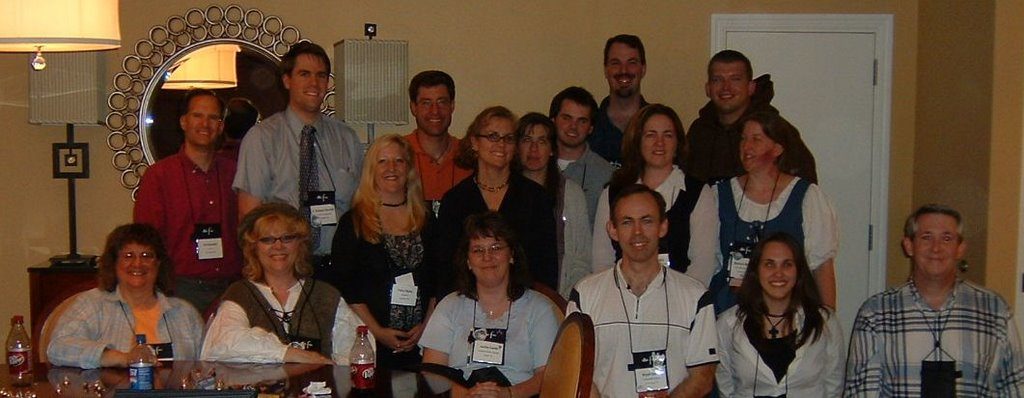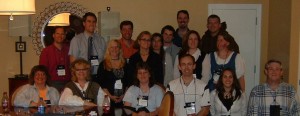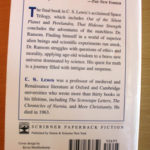What’s Your WIP?
It occurs to me that three weeks into the relaunched Speculative Faith, I don’t know two things:
- Where the acronym WIP, Work in Progress, originated: an industry term, or informal?
- What novels Speculative Faith readers, and my fellow contributors here, are writing.
So this is me asking everyone: pitch it. I believe that qualifies as proper etiquette. Don’t worry about sounding like a spammer if you write a comment and try to sell your story, because I’ve asked for it. Link to your own site or Amazon page if you wish. “Let’s see what’s out there.”
What is your genre, or what are your attempting-hybridized genres? What pictures were in your mind before you started work? Do you outline, and if so, how so? What has inspired you?
Moreover, of course, what do you think would make someone want to read your WIP?
I’m also curious about any informal “codes” when it comes to referring to projects. Especially if a project is unpublished, do you call it a book — as in, “My book is about …”? I ask this because I could be a bit silly about my own vocabulary; I usually don’t call my project a book because it isn’t technically a book. Calling it a book now could also sound pretentious; yet it comes to mind that although I prefer the term novel, that could also sound pretentious. …
With this year’s American Christian Fiction Writers conference coming up, this September in Indianapolis, it’s helpful to get these things straight. I haven’t been since the half-conference I attended in 2007 (had to meet a girl and get married, you see).
Agent Rachelle Gardner offers tips about pitching your project, impromptu, here. And from this I draw one overall conclusion: focus on your story’s plot, the conflict, not its Timeless Theme:
Over the weekend as I listened to writers’ pitches, I often heard something like (this is hypothetical):
A woman is distraught and angry about her teenage daughter’s drug use, but finally comes around to be able to forgive her and help her.
To this, I might ask, “Good, so what’s the story?”
Well, the mother has a hard time with this because of her own past drug use, and she vowed her own children would never use drugs, and she has to learn that we’re all human and that her daughter needs her help.
Me: “Okay, so how does all of this happen? What’s the story?”
Um, the mother finally forgives her daughter, and gets her into rehab.
Grrr. Can you see that this is not a novel? At this point, I’ve been given a premise and a resolution, but I still have no idea what happens between page 1 and page 400.
With that in mind — perhaps necessitating a rewritten pitch! — what is your story?












































I tend to call things a project in their initial stages. They might turn into an article or novel or something else. So it starts as a project in process. A PIP.
What do you call it when something is just a jumbled collection of ideas, characters, settings, situations, scraps of dialogue. So far the title has crystalised into a single word, which inspires me to understand what it is I’m getting myself into. I’ve got a sketch of a map of the world in which all this stuff is supposed to happen. Some names and places.
I don’t know if this is recommended procedure in any writing book, but I went to a local toyshop and bought a dragon. I clear the dining room table, sit the dragon in the centre and lean on the end. I look at it and it look at me, and we are just going to see what happens fron there.
It’s a sort of dragon romance in progress. A DRIP. I’ll leave the rest of the alphabet for everyone else.
Well, I like this post and want to play along. My WIP is the four-book epic fantasy The Lore of Efrathah, of which I am working on a draft of book four. I’m excited to be so close to the finish line, but the work seems to be harder. Still … I have no doubt you all will hear when I wrapped it all up.
So it’s a lore in progress, or LIP.
Becky gives lip? 0=)
I tend to refer to either “a half an idea” (which just means it’s not fleshed out enough to really work with yet, or really talk about) or “the writing project.” (Uncreative, yes.)
What is your genre, or what are your attempting-hybridized genres?
I’m making a hybrid. It’s YA, but the characters range from age 17 and up, so I can widen the possibilities a bit. It’s mostly a mystery/suspense with some supernatural flavoring that I’m trying to use…differently (that’s the short version).
What pictures were in your mind before you started work?
The old version had a girl shooting her youth pastor during service (scene one). It went a different direction (it had no plot and was too conceptual to make work). The new direction includes:
–a haunted, gothic-style mansion on a mountainside outside a small town in Wyoming
–an 18 yr old girl washing up on the beach of Liberty Island with a demon after her and an angel helping her escape (wound up leaving that when I decided it was too much)
–the same girl in a white dress with a sword
–assassin-priests who consume their victims and can create illusions so they appear to be gargoyles, large birds of prey, or wolves
–a monk who can make Rambo cry
It got a little weird after that.
Do you outline, and if so, how so?
I’m in the middle. It’s more like road-tripping: A few destination points, and everything else is up for grabs. I’ll probably never look at the storyboard again, so it tends to change as something better presents itself.
What has inspired you?
So many things….
Moreover, of course, what do you think would make someone want to read your WIP?
I’m a substitute teacher (jr. high and high school). All I have to do is tell the kids I was in a cemetery with a machete (which is true) and they go bug-eyed. Right now, when they ask what I’m working in, I just tell them there’s a cannibal involved. One kid wants to be eaten.
I’m also curious about any informal “codes” when it comes to referring to projects.
Depending on who I’m talking to:
–ritual cannibals
–the haunted house story
–the church brats book
–the mystery/spiritual warfare book (minus the dude running down the street screaming “demon, be vanquished” and minus the angels and demons overhead)
–“BR” (working title is “Bruising Reeds,” so “BR” for short)
–The Beowulf Hates Me game (Beowulf is the main character’s name; yes, he’s named after Beowulf)
I’m still working on a formal “pitch,” I think.
1. I have no idea where the term WIP comes from!
2. My current WIP is about an elf, Einar who is given the task to protect two members of royalty from assassins. But when his past comes chasing after him, Einar must decide whether to trust his two new friends with his secrets and risk rejection, or keep his secrets and risk their lives.
I have a better pitch, but I can’t find it in my files…